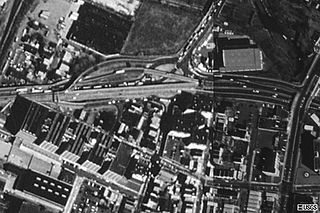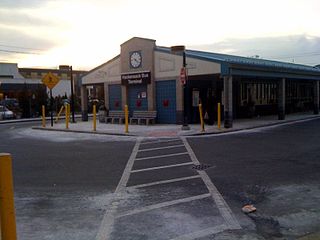
Little Ferry is a borough in Bergen County, in the U.S. state of New Jersey. As of the 2020 United States census, the borough's population was 10,987, an increase of 361 (+3.4%) from the 2010 census count of 10,626, which in turn reflected a decline of 174 (−1.6%) from the 10,800 counted in the 2000 census.

Haledon is a borough in Passaic County, in the U.S. state of New Jersey. As of the 2020 United States census, the borough's population was 9,052, an increase of 734 (+8.8%) from the 2010 census count of 8,318, which in turn reflected an increase of 66 (+0.8%) from the 8,252 counted in the 2000 census.

Hackensack is the most populous municipality and the county seat of Bergen County, in the U.S. state of New Jersey. The area was officially named New Barbadoes Township until 1921, but has informally been known as Hackensack since at least the 18th century. As of the 2020 United States census, the city's population was 46,030, its highest decennial count ever and an increase of 3,020 (+7.0%) from the 2010 census count of 43,010, which in turn reflected an increase of 333 (+0.8%) from the 42,677 counted in the 2000 census.

A diner is a type of restaurant found across the United States and Canada, as well as parts of Western Europe and Australia. Diners offer a wide range of cuisine, mostly American cuisine, a casual atmosphere, and, characteristically, a combination of booths served by a waitstaff and a long sit-down counter with direct service, in the smallest simply by a cook. Many diners have extended hours, and some along highways and areas with significant shift work stay open for 24 hours.

The Budd Company was a 20th-century metal fabricator, a major supplier of body components to the automobile industry, and a manufacturer of stainless steel passenger rail cars, airframes, missile and space vehicles, and various defense products.

White Manna and White Mana are the names of two fast food diners in the U.S. state of New Jersey, named after manna, the Biblical food. The restaurants were ranked on America's best burgers list along with White Rose Hamburgers, another New Jersey burger joint.
New Jersey's 9th congressional district is an urban congressional district in the U.S. state of New Jersey, and was represented in Congress by Democrat Bill Pascrell until his death in 2024, first elected in 1996 from the old 8th district. The 9th district consists largely of municipalities in Bergen and Passaic Counties.

The Fodero Dining Car Company (1933–1981) was a diner manufacturer located in Newark and later Bloomfield, New Jersey. It was founded by Italian immigrant Joseph Fodero, who formed the company after constructing diners with P. J. Tierney Sons and Kullman Industries.

Marion is a section of Jersey City in Hudson County, in the U.S. state of New Jersey.

The Hackensack Plank Road, also known as Bergen Turnpike, was a major artery which connected the cities of Hoboken and Hackensack, New Jersey. Like its cousin routes, the Newark Plank Road and Paterson Plank Road, it travelled over Bergen Hill and across the Hackensack Meadows from the Hudson River waterfront to the city for which it was named. It was originally built as a colonial turnpike road as Hackensack and Hoboken Turnpike. The route mostly still exists today, though some segments are now called the Bergen Turnpike. It was during the 19th century that plank roads were developed, often by private companies which charged a toll. As the name suggests, wooden boards were laid on a roadbed in order to prevent horse-drawn carriages and wagons from sinking into softer ground on the portions of the road that passed through wetlands. The company that built the road received its charter on November 30, 1802. The road followed the route road from Hackensack to Communipaw that was described in 1679 as a "fine broad wagon-road."

The Crusader was a 5 car stainless steel streamlined express train that ran on a 90.3-mile (145.3 km) route from Philadelphia's Reading Terminal to Jersey City's Communipaw Terminal, with a ferry connection to Lower Manhattan at Liberty Street. The Reading Railroad provided this service in partnership with the Central Railroad of New Jersey (CNJ), in which it was the majority owner of capital stock. Trains including the Crusader ran on Reading Railroad tracks from Reading Terminal in Philadelphia to Bound Brook, NJ, where they continued on CNJ tracks to Communipaw Terminal in Jersey City. Passengers then left the train and walked aboard the ferry or boarded busses that loaded onto the ferry. Introduced in 1937, the Crusader service declined during the 1960s, and the name was ultimately dropped in 1981.

Shippen Street is an east-west street in Weehawken, New Jersey. The eastern terminal, a cobblestone double hairpin turn is listed on the New Jersey Register of Historic Places. Shippen Street was developed at the start of the 20th century as part of the Weehawken Heights, one of the town's residential neighborhoods.

Hackensack Bus Terminal, also called the Hackensack Bus Transfer, is a regional bus station in downtown Hackensack, New Jersey, owned and operated by New Jersey Transit. The bus station was built in the 1970s and was extensively renovated in 2007 while starting in 2006. An outdoor central island boarding–disembarking area surrounds an indoor waiting room and ticketing facilities. Service from nearby bus stops travels to locations in Bergen, Passaic, Essex and Hudson counties as well as the Port Authority Bus Terminal and George Washington Bridge Bus Station in New York City. In October 2018, the Hackensack Transit Connector, servicing the bus terminal, the city's train stations, and the County Courthouse Complex, was initiated.

Munson Diner is a historic diner located at Liberty in Sullivan County, New York. It was manufactured in 1945 by the Kullman Dining Car Company of Lebanon, New Jersey. It has a riveted steel frame and exterior of stainless steel and porcelain enamel. It has a long, rectangular form, 16 feet wide by 50 feet long. The interior has a plan typical of the diners of the 1940s and 1950s. It was moved from West 49th Street and 11th Avenue, New York City, to Liberty in 2005.

The Jerry O'Mahony Diner Company of Elizabeth, New Jersey, was a manufacturer of roadside diners from 1917 to 1952. The company produced some 2,000 of the long, narrow, primarily metal buildings, perhaps more than any other firm. Prefabricated in a factory and trucked to their locations, the diners resemble and are often confused with railroad rolling stock. The company's motto was "In our line, we lead the world".

Rosie's Diner is located in Rockford, Michigan. The dining car originally opened during the 1940s in Little Ferry, New Jersey, as the Silver Dollar Diner. After multiple commercials were filmed in the diner for Bounty paper towels with a fictional character named Rosie the Waitress, the diner was renamed Rosie's. Previously offered to the Smithsonian Institution, the restaurant was sold in the 1990s to a Michigan artist who had the building moved to its current location next to another diner. A third diner was later moved to the site from Fulton, New York. A series of replicas were built as part of a chain of restaurants in the Denver area.

Kullman Dining Car Company, established in Newark, New Jersey in 1927, originally manufactured diners. The company expanded and later became the Kullman Building Corporation. It relocated to Avenel and finally to Clinton Township and over the years production grew to include prefabricated housing, dormitories, prisons, schools, banks, equipment buildings of cellular communications towers. It also built the first pre-fabricated United States Embassy in Guinea-Bissau in West Africa. The company is known for incorporating the use of new materials, such as stainless steel and formica, as they were developed and applying technologies developed through construction of diners to other buildings and is credited with introducing the term accelerated construction The company re-organized in bankruptcy and Kullman Industries went out of business in 2011. XSite Modular, a company formed by the management team that left prior to Kullman going out of business, now owns all the Kullman Intellectual Property purchased at auction.

Silk City Diners was a division of the Paterson Wagon Company, later known at Paterson Vehicle Company, established by Everett Abbott Cooper and based in Paterson, New Jersey, which produced about 1,500 diners from 1926 until 1966. Each was tagged with the year and order in which it was built; for example, 5607 would be the seventh diner manufactured in 1956. Several have been listed on the National Register of Historic Places (NRHP).

Aetna Diner, also known as Comet Diner, Hog River Grille, and Dishes, is a historic diner located at 267 Farmington Avenue in the Asylum Hill neighborhood of Hartford, Connecticut. Built in 1947 by Paramount Diners and assembled in 1948, the diner was prefabricated from stainless steel. Aetna Diner was listed on the National Register of Historic Places in 2021.

















